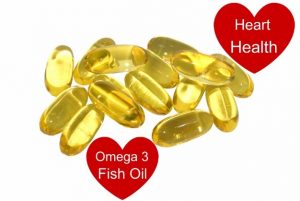How Much Omega-3s Do You Need?

In previous issues of “Health Tips From The Professor” I have described the medical consensus about omega-3 supplementation and heart disease as resembling a pendulum.
A few positive studies are published, and the pendulum swings in the positive direction. The medical consensus becomes, “Omega-3s may reduce heart disease risk.”
Then a few negative studies are published, and the pendulum swings in the other direction. The consensus becomes that omega-3 supplements are worthless. One review a few years ago went so far as to say that fish oil supplements were the modern-day version of snake oil.
Meta-analyses combine the data from multiple clinical studies to increase statistic power and minimize the effect of clinical studies that are outliers. They are supposed to provide clear answers to medical questions like the effect of omega-3 supplements on heart disease.
However, the meta-analyses published to date have also reached conflicting conclusions about the effectiveness of omega-3 supplementation. No wonder you [and the medical community] are confused!
In 2018 three large, well-designed, clinical studies looking at the effect of omega-3 supplementation on heart disease risk were published. They reached different conclusions. However, they covered a much wider range of omega-3 doses than previous studies. And the studies with the highest doses of omega-3s showed the most positive effect of omega-3 supplementation on the reduction of heart disease risk.
That lead a group of doctors and scientists from the United States and Finland to postulate that many previous studies had failed to find an effect of omega-3 supplements on heart disease risk because the dose of omega-3s they used was too low.
These scientists designed a very large meta-analysis (AA Bernasconi et al, Mayo Clinic Proceedings, doi.org/10.1016/j.mayocp.2020.08.034) to test their hypothesis. In short, their study was designed to:
- Determine whether supplementation with the omega-3 fatty acids EPA and DHA resulted in reduced heart disease risk.
- Quantify the relationship between the dose of EPA + DHA and the risk of heart disease outcomes.
How Was The Study Done?
 This study was a meta-analysis of 40 randomized control clinical studies on the effect omega-3 supplementation on heart disease outcomes. Specifically:
This study was a meta-analysis of 40 randomized control clinical studies on the effect omega-3 supplementation on heart disease outcomes. Specifically:
- It included all high-quality clinical studies of omega-3 supplementation published before August 2019.
- It included a total of 135,267 participants.
- It included participants at both low and high risk of developing heart disease.
- It included studies of supplementation with EPA alone and with EPA + DHA.
- It included omega-3 doses ranging from 400 mg/day to 5,500 mg/day.
- It excluded dietary studies because:
-
- It is difficult to measure the dosage of omega-3s that participants are consuming in dietary studies.
-
- It is difficult to assure their compliance with dietary advice.
-
- There is variation in the omega-3 content of various foods.
-
- Participants in these studies are often advised to make other changes in diet. It then becomes difficult to know whether any benefits observed were from changes in omega-3s or from changes in other components of the diet.
Update On Omega-3 Supplementation And Heart Disease
 Here are the results of the meta-analysis. Supplementation with EPA or EPA + DHA reduced:
Here are the results of the meta-analysis. Supplementation with EPA or EPA + DHA reduced:
- Coronary Heart disease (defined as diseases caused by atherosclerosis, such as angina, heart attack, and heart failure) by 10%.
- Heart Attacks by 13%.
- Coronary Heart disease deaths by 9%.
- Heart attack deaths by 35%.
Because of the large number of participants in this meta-analysis, they were able to reach some other important conclusions:
- Despite the claims you may have heard about a new drug consisting of highly purified EPA, this study found no evidence that EPA supplementation was superior to EPA + DHA supplementation.
- Even though heart medications provide some of the same benefits as omega-3s, this study concluded that omega-3 supplementation reduced the risk of heart disease even for patients on multiple heart medications.
- This study also concluded that omega-3 supplementation was likely to be effective for people at both low and high risk of heart disease. This means that omega-3 supplementation is likely to be beneficial for preventing heart disease.
The authors concluded: “The current study provides strong evidence that EPA + DHA supplementation is an effective strategy for the prevention of certain coronary heart disease outcomes…Considering the relatively low costs and side effect profiles of omega-3 supplementation and the low drug-drug interactions with other standard therapies…clinicians and patients should consider the potential benefits of omega-3 (EPA/DHA) supplementation…”
What Does This Study Mean For You?
 The most significant conclusions from this study are the reduction in heart attacks and heart attack deaths. That is because:
The most significant conclusions from this study are the reduction in heart attacks and heart attack deaths. That is because:
- Approximately 1.5 million Americans suffer a heart attack each year. For those who survive their quality of life may be permanently altered.
-
- A 13% reduction in heart attacks means that something as simple as EPA + DHA supplementation might prevent as many as 195,000 heart attacks a year.
- Approximately 100,000 Americans will die from a heart attack each you.
-
- A 35% reduction in heart attack deaths means that EPA + DHA supplementation might prevent as many as 35,000 deaths from heart attacks each year.
- For many Americans sudden death from a heart attack is the first indication that they have heart disease.
-
- As Benjamin Franklin said, “An ounce of prevention is worth a pound of cure”. That is why EPA + DHA supplementation makes sense for most people.
I can’t say that this study will be the final word on omega-3 supplementation and heart disease risk. However, several recent studies have supported the benefit of omega-3 supplementation at reducing heart disease risk. The pendulum has clearly swung in the direction of omega-3s being beneficial for heart health.
Of course, omega-3 supplementation is not a magic “Get Out of Jail Free” card. You can’t expect it to overcome the effects of a bad diet and lack of exercise with omega-3 supplementation alone. You need a holistic approach.
The American Heart Association recommends:
- If you smoke, stop.
- Choose good nutrition.
-
- Choose a diet that emphasizes vegetables, fruits, whole grains, low-fat dairy products, poultry, fish, legumes, non-tropical vegetable oils, and nuts.
-
- Choose a diet that limits sweets, sugar-sweetened beverages, and red meats.
- Reduce high blood cholesterol and triglycerides.
- Reduce your intake of saturated fat, trans fat and cholesterol and get moving.
- Lower High Blood Pressure.
- Be physically active every day.
-
- Aim for at least 150 minutes per week of moderate-intensity physical activity per week.
- Aim for a healthy weight.
- Manage diabetes.
- Reduce stress.
- Limit alcohol.
- Have a regular physical checkup.
Add in omega-3 supplementation to these recommendations and you have a winning combination.
How Much Omega-3s Do You Need?
 As I mentioned at the beginning of this article the omega-3 dosages used in the studies included in this meta-analysis ranged from 400 mg/day to 5,500 mg/day. More importantly, there were enough participants in these studies to obtain a fairly accurate estimate of dose response. This allow the authors to answer the question, “How much omega-3s do I need?”The study found that:
As I mentioned at the beginning of this article the omega-3 dosages used in the studies included in this meta-analysis ranged from 400 mg/day to 5,500 mg/day. More importantly, there were enough participants in these studies to obtain a fairly accurate estimate of dose response. This allow the authors to answer the question, “How much omega-3s do I need?”The study found that:
- The protective effect of omega-3s for heart attack deaths and coronary heart disease deaths plateaued with dosages of EPA + DHA that exceeded 800 – 1200 mg/day.
- The dose response of the protective effect of omega-3s for non-fatal heart attacks was linear over a wider range of dosages, with every increase 1,000 mg/day of EPA + DHA decreasing the risk of heart attack by 9%.
Based on the totality of their data, the authors concluded, “…clinicians and patients should consider the potential benefits of omega-3 supplementation, especially using 1,000 to 2,000 mg/day dosages, which are rarely obtained in most Westernized diets, even those including routine fish consumption.”
The Bottom Line
A recent meta-analysis combined the data from 40 clinical studies with over 135,000 participants looking at the effect of omega-3 supplementation on various types of heart disease. The study found that supplementation with EPA or EPA + DHA reduced:
- Coronary Heart disease (defined as diseases caused by atherosclerosis, such as angina, heart attack, and heart failure) by 10%.
- Heart Attacks by 13%.
- Coronary Heart disease deaths by 9%.
- Heart attack deaths by 35%.
Because of the large number of participants in this meta-analysis, they were able to reach some other important conclusions:
- This study found no evidence that EPA supplementation was superior to EPA + DHA supplementation.
- This study concluded that omega-3 supplementation reduced the risk of heart disease even for patients on multiple heart medications.
- This study also concluded that omega-3 supplementation was likely to be effective for people at both low and high risk of heart disease. This means that omega-3 supplementation is likely to be beneficial for preventing heart disease.
- The optimal dose of EPA + DHA appeared to be 1,000 – 2,000 mg/day.
The authors of the study concluded: “The current study provides strong evidence that EPA + DHA supplementation is an effective strategy for the prevention of certain coronary heart disease outcomes…Considering the relatively low costs and side effect profiles of omega-3 supplementation and the low drug-drug interactions with other standard therapies…clinicians and patients should consider the potential benefits of omega-3 (EPA/DHA) supplementation, especially using 1,000 to 2,000 mg/day dosages, which are rarely obtained in most Westernized diets, even those including routine fish consumption.”
For more details, including a more detailed discussion of what this study means for you, read the article above.
These statements have not been evaluated by the Food and Drug Administration. This information is not intended to diagnose, treat, cure, or prevent any disease.

